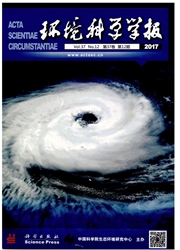

 中文摘要:
中文摘要:
为了寻求蚯蚓粪便(VM)新型、安全的资源化利用途径,采用慢速热解碳化VM制备生物炭(VMBC)并用作吸附剂.对比分析VM和VMBC的元素组成、pH、电导率、孔结构和表面官能团等理化性质及其热解行为的差异.同时,考察VMBC对罗丹明B(RB)吸附性能,并进一步探讨潜在的吸附机理.结果表明,VM经过热解碳化后,C、H、O、N、S的含量下降,芳香性和非极性增大.热重分析显示,VM有4个明显的失重阶段,且失重量较大,而VMBC在〈220℃和〉600℃有2个失重阶段,且失重量较小,表明VMBC热稳定性更高.VMBC对RB吸附在12 h达到平衡,增加pH不利于RB的吸附,且吸附过程为吸热反应.Freundlich模型对RB吸附结果拟合较好(R2=0.94).VMBC对RB吸附符合二级动力学模型(R2=0.94),表明VMBC主要通过化学作用对RB进行吸附.VMBC表面官能团(—OH、—NH和C—H等)对RB的吸附起重要作用,而内扩散和静电作用不是控制吸附的主导作用.
 英文摘要:
英文摘要:
In order to develop a novel way for safe utilization of vermicompost( VM),VM was carbonized by slow pyrolysis to produce vermicompost biochar( VMBC) as an adsorbent. The main characteristics of VM and VMBC,including elemental composition,pH,electrical conductivity,pore structure and surface functional groups,were compared,as well as their pyrolysis behaviors were analyzed by thermogravimetry( TG) as well. Moreover,the adsorption of VMBC to Rhodamine-B( RB) and the potential mechanisms were also investigated.Results indicated that C,H,O,N and S in VM were decreased,whereas aromaticity and nonpolarity were enhanced after carbonization. TG curves revealed that the weight loss of VM significantly depended on pyrolysis temperature with 4 distinguishable periods. However,VMBC exhibited a higher thermal stability with only 2 weight loss periods at 220 ℃ and 600 ℃,respectively. The adsorption to RB by VMBC can be regarded as an endothermic process due to higher temperature that was beneficial to RB adsorption. Adsorption equilibrium can be achieved at approximately 12 h,and the increased pH can decrease the RB adsorption. Freundlich adsorption isotherms model can well describe the adsorption process( R2= 0.94). The adsorption kinetic can be well simulated by second order model( R2= 0.94),indicating that the RB adsorption was dominated by chemical adsorption. Surface functional groups,including —OH,—NH,C—H,on VMBC played key roles in RB adsorption. However,the intraparticle diffusion in pore and the electrostatic adherence can be neglected.
 同期刊论文项目
同期刊论文项目
 同项目期刊论文
同项目期刊论文
 期刊信息
期刊信息
